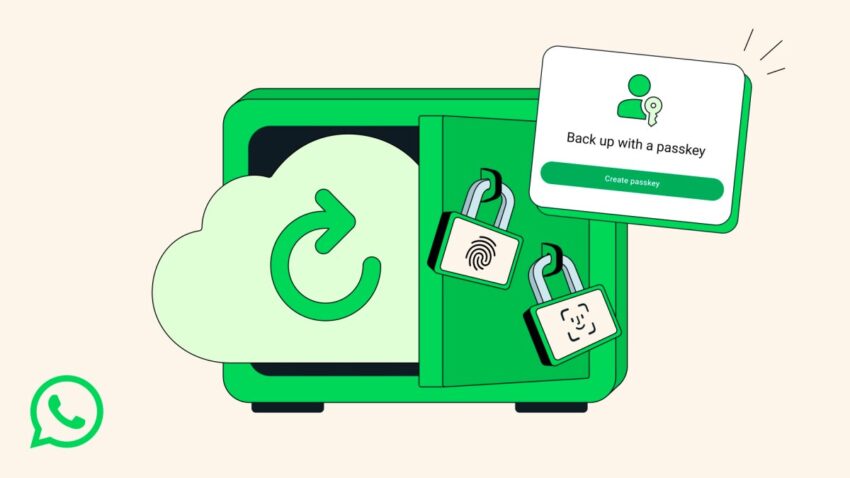
whatsapp adds passkey protection to end-to-end encrypted WhatsApp has introduced a new security feature that enhances the protection of end-to-end encrypted backups through the use of passkeys.
whatsapp adds passkey protection to end-to-end encrypted
Understanding the New Feature
WhatsApp’s latest update focuses on bolstering the security of user data by implementing passkey protection for end-to-end encrypted backups. This feature allows users to access their backups using biometric methods such as fingerprint or facial recognition, as well as traditional screen lock codes. The introduction of this feature is particularly significant for users who may lose their devices, as it provides a secure way to retrieve their data without compromising their privacy.
The Importance of End-to-End Encryption
End-to-end encryption (E2EE) has become a cornerstone of secure communication platforms, ensuring that only the sender and recipient can access the messages exchanged. WhatsApp has been a pioneer in this area since it implemented E2EE in 2016. This technology encrypts messages in such a way that even WhatsApp itself cannot read them. However, while E2EE protects messages during transmission, the security of backups has been a concern for many users.
Prior to this update, users could back up their chats to cloud services like Google Drive or iCloud, but these backups were not always protected by the same level of encryption that secured messages in transit. This vulnerability raised questions about the safety of sensitive information stored in backups. With the addition of passkey protection, WhatsApp aims to address these concerns and enhance user confidence in the security of their data.
How Passkey Protection Works
The passkey protection feature allows users to set up a unique passkey that must be entered to access their encrypted backups. This means that even if someone gains access to the cloud storage where the backups are stored, they would still need the passkey to decrypt and access the data. The implementation of this feature is designed to be user-friendly, allowing for quick access through familiar biometric methods.
Biometric Authentication
Biometric authentication has gained popularity in recent years due to its convenience and security. With the new passkey protection, users can utilize:
- Fingerprint Scanning: Users can unlock their backups using their registered fingerprints, making it a quick and secure method of access.
- Facial Recognition: For devices equipped with facial recognition technology, users can simply look at their device to gain access to their backups.
- Screen Lock Codes: Traditional screen lock codes remain an option for users who prefer not to use biometric methods.
This multi-faceted approach to authentication not only enhances security but also caters to a wide range of user preferences and device capabilities.
Implications for Users
The introduction of passkey protection has several implications for WhatsApp users, particularly concerning data security and user experience.
Enhanced Security
With the new feature, users can feel more secure knowing that their backups are protected by an additional layer of security. This is especially important for individuals who use WhatsApp for sensitive communications, such as business discussions or personal matters. The risk of unauthorized access to backups is significantly reduced, as potential intruders would need not only access to the cloud storage but also the passkey.
User Experience
WhatsApp has always prioritized user experience, and the addition of passkey protection is no exception. The integration of biometric authentication methods allows for a seamless experience when accessing backups. Users can retrieve their data quickly without the need to remember complex passwords or passcodes. This ease of use is likely to encourage more users to take advantage of the backup feature, knowing that their data is secure.
Stakeholder Reactions
The introduction of passkey protection has garnered attention from various stakeholders, including cybersecurity experts, privacy advocates, and users themselves.
Cybersecurity Experts
Cybersecurity experts have generally welcomed the new feature, viewing it as a positive step towards enhancing user security. Many experts emphasize the importance of protecting backups, as they can often contain sensitive information that, if compromised, could lead to serious privacy breaches. The implementation of passkey protection aligns with best practices in data security and is seen as a necessary evolution in the platform’s security measures.
Privacy Advocates
Privacy advocates have also expressed approval of the update, noting that it reflects a growing awareness of the importance of user privacy in the digital age. The ability to secure backups with passkeys is seen as a significant advancement in protecting user data from unauthorized access. Advocates argue that such features should become standard across all messaging platforms, as they empower users to take control of their data security.
User Feedback
User reactions have been largely positive, with many expressing appreciation for the added security. Some users have noted that the feature provides peace of mind, especially for those who frequently switch devices or are concerned about losing their phones. However, there are also concerns about the potential for forgetting passkeys, which could lead to difficulties in accessing backups. WhatsApp has addressed this by allowing users to set recovery options, ensuring that they can regain access if they forget their passkey.
Future Developments
The introduction of passkey protection is part of WhatsApp’s ongoing commitment to enhancing user security and privacy. As technology evolves, it is likely that the platform will continue to explore new ways to protect user data. Future developments may include:
- Multi-Factor Authentication: Expanding on the current passkey system, WhatsApp may introduce multi-factor authentication options to further secure user accounts.
- Improved Encryption Protocols: Continuous improvements to encryption protocols could enhance the security of both messages and backups.
- User Education: WhatsApp may implement educational initiatives to inform users about best practices for securing their accounts and backups.
Conclusion
The addition of passkey protection to WhatsApp’s end-to-end encrypted backups marks a significant advancement in the platform’s security features. By allowing users to access their backups through biometric methods and screen lock codes, WhatsApp is addressing longstanding concerns about the safety of user data stored in the cloud. This update not only enhances security but also improves the overall user experience, making it easier for individuals to manage their data securely.
As the digital landscape continues to evolve, the importance of robust security measures cannot be overstated. WhatsApp’s proactive approach to safeguarding user data sets a precedent for other messaging platforms, highlighting the need for continuous innovation in security practices. With the introduction of passkey protection, WhatsApp is taking a significant step towards ensuring that users can communicate and store their information with confidence.
Source: Original report
Was this helpful?
Last Modified: October 31, 2025 at 8:36 am
0 views















